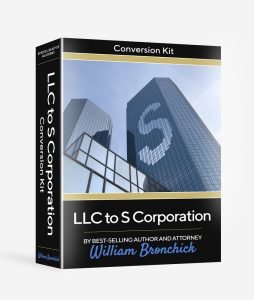Should You Convert Your
Single Member LLC to an S corp?
The LLC taxed as S corporation – good idea or bad?
By default, a single-member LLC is classified for tax purposes as a “disregarded” entity, that is, the entity is ignored by the IRS and the sole member is the taxpayer. Thus, an individual as a sole member running a business would be taxed on his personal return as a schedule C, sole proprietor. Many businesses run this way, which has no tax advantages and high risk of audit.
Most tax professionals would recommend running an operating business (especially with employees) as an S corporation rather than as a sole proprietor. This is mainly to reduce the amount the corporation’s owner pays in self-employment (FICA) tax. A secondary reason is that a small business S corporation has a lower risk of an audit than a schedule C sole proprietor business.
But, what if you already formed an LLC? No worry, you can convert the LLC for federal income tax purposes to an S corporation. This involves several steps:
- Get a federal tax ID# from the IRS.
- File IRS form 8832 to choose an entity election as a corporation
- File an S corporation election form (IRS form 2553)
- Amend your operating agreement to allow for the new taxation rules (or, if you don’t have one at all, CREATE an operating agreement).
The LLC tax as an S corporation may require the assistance of a tax advisor and/or attorney to complete, depending on how comfortable you are with the forms and documentation. A “generic” operating agreement used for a typical LLC is not appropriate because it does not address the specific provisions of the tax code dealing with S corporate taxation. Thus, you need something more tailored to deal with an LLC taxed as an S corporation.
The next issue is whether the LLC taxed as S corporation must ACT like a corporation for tax purposes even though the state LLC laws may not require it? For example, do you need to issue stock certificates, have annual meetings and resolutions like a corporation. In theory, no, because state LLC laws in most states do not require these formalities. In fact, most state LLC statutes say that failure to have ANY formalities (such as an operating agreement or minutes) is NOT by itself a reason for a court to “pierce the corporate veil” (hold the member liable personally for LLC debts).
While still a rather new concept, the LLC taxed as S corporation can be a feasible proposition for someone who formed a single member LLC and should have really created an S corporation.
Note that the LLC taxed as S corporation is better for businesses with ordinary income that would normally be subject to self-employment tax on a schedule C. For passive income such as rental income, the LLC taxed as a partnership (requiring more than one member) is usually recommended.

